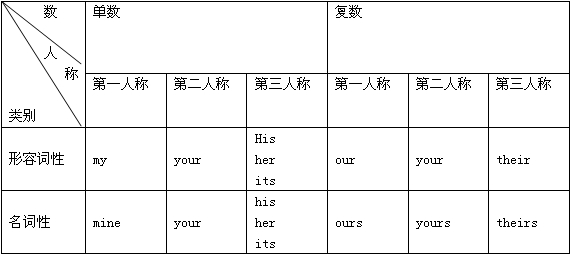本试题 “My ruler is ______ than ______.[ ]A. longer; hisB. longer; heC. long; himD. longest; him” 主要考查您对物主代词
形容词的比较级,形容词的最高级
等考点的理解。关于这些考点您可以点击下面的选项卡查看详细档案。
- 物主代词
- 形容词的比较级,形容词的最高级
表示所有关系的代词叫做物主代词,也叫人称代词的所有格。
物主代词分为形容词性物主代词和名词性物主代词两种。
物主代词有人称和数的变化。第三人称单数的物主代词还有性别的变化。
物主代词的用法:
物主代词既有表示所属的作用又有指代作用,例如:
John had cut his finger; apparently there was a broken glass on his desk.
约翰割破了手指,显而易见,他桌子上有个破碎的玻璃杯。
物主代词有形容词性(my, your等)和名词性(mine, yours等)两种:
形容词性的物主代词属于限定词。
名词性的物主代词在用法上相当于省略了中心名词的 -'s属格结构,例如:
Jack's cap 意为 The cap is Jack's.
His cap 意为 The cap is his.
形容词性物主代词用法:
1. 形容词性物主代词相当于形容词,在句中只能用作定语,后面必须跟名词。名词性物主代词常用来避免和前面已提及的名词重复。
相当于【形容词性物主代词+名词】。例如:
Is that yourbike? 那是你的自行车吗?
My pen is quite different from his.
2. 如果名词前用了形容词性物主代词,就不能再用冠词(a, an, the)、指示代词(this, that, these, those)等修饰词了。例如:
这是他的书桌。This is his desk.
3. 与形容词一起修饰名词时,形容词性物主代词要放在形容词的前面。例如:
his English books他的英语书。
their Chinese friends他们的中国朋友。
4. 汉语中经常会出现"我妈妈","你们老师"等这样的语言现象,虽然代词用的是"我"、"你们",但实际意义仍是"我的"、"你们的",
所以在英译时,注意要用形容词性物主代词"my","your"。
例如:你妈妈在家吗?
误:Is you mother at home?
正:Is yourmother at home?
5. it's与its读音相同,he's与his读音相似,但使用时需注意它们的区别(it's和he's分别是it is和he is的缩略形式,但its 和his 却是形容词性物主代词) 。
例如: It's a bird. Its name is Polly. 它是一只鸟。它的名字叫波利。
He's a student. His mother is a teacher. 他是一名学生。他妈妈是一位教师
口诀:
有“名”则"形“,无“名”则“名”。
意思是:后面是名词的话,前面就要用 形容词性物主代词。后面没有名词的话,就用名词性物主代词。
名词性物主代词的句法功能:
a. 作主语,例如:
May I use your pen? Yours works better.
我可以用一用你的钢笔吗? 你的比我的好用。
b.作宾语,例如:
I love my motherland as much as you love yours.
我爱我的祖国就像你爱你的祖国一样深。
c.作介词宾语,例如:
You should interpret what I said in my sense of the word, not in yours.
你应当按我所用的词义去解释我说的话,而不能按你自己的意义去解释。
d.作主语补语,例如:
The life I have is yours. It's yours. It's yours. 我的生命属于你,属于你,属于你。
名词性物主代词可以用在介词of的后面,相当于“of+名词所有格”。
口诀
有“名”则"形“,无“名”则“名”。
注:
后面是名词的话,前面就要用 形容词性物主代词。
后面没有名词的话,就用名词性物主代词.
形容词性物主代词与名词性物主代词的区别:
一.形容词性物主代词起形容词的作用,用在名词前。
例:
1. This is my book.这是我的书。
2. We love our motherland.我们热爱我们的祖国。
二.名词性物主代词起名词的作用。
例:
1. Look at the two pencils. The red one is yours and the blue one is mine.
看那两支铅笔,红的是你的,蓝的是我的。
2. He likes my pen. He doesn't like hers.
他喜欢我的钢笔。不喜欢她的。
3. 注意:在使用名词性物主代词时,必须有特定的语言环境,也就是要省略的名词。
例:
It's hers.是她的。
(单独使用大家不知是怎么回事,不可以这样用)
There is a book. It's hers.那有本书。是她的。
(先提及,大家才明白)
4. 名词性物主代词=形容词性物主代词+名词
为避免重复使用名词,有时可用“名词性物主代词”来代替“形容词性物主代词+名词”的形式。
例:
My bag is yellow, her bag is red, his bag is blue and your bag is pink.
为避免重复使用bag,可写成My bag is yellow, hers is red, his is blue and yours is pink.
物主代词“形”变“名”歌:
形物代变名物代
掌握规律变得快
多数词尾加-- s
my,its,his要除外
my把y来变成i
接着再把 ne 带
his,its 不用变
词形一样莫奇怪

当两种物体之间相互比较时,我们要用形容词或副词的比较级;
当相互比较的物体是三个或三个以上时,我们就要用形容词或副词的最高级。
形容词的比较级和最高级的特殊变化规则:
一、少数单音节词前面加 more-, most- 构成比较级和最高级
tired ---- more tired , most tired
fond ----- more fond , most fond
glad ----- more glad , most glad
bored ---- more bored , most bored
pleased---- more pleased , most pleased
二、不规则变化
good /well------- better ,best
bad/badly/ill------ worse , worst
many/much-------more , most
little ------ less , least
far ---- farther, farthes / firther , furthest
old ---- older , oldest (GA)
---- older , oldest / elder , eldest (GB)
三、下列形容词和副词的比较级和最高级有两种形式
cruel----- crueler, cruelest /more cruel , most cruel
strict---- stricter , strictest /more strict , most strict
often----- oftener , oftenest / more often , most often
friendly------ friendlier , friendliest / more friendly , most friendly
clever----- cleverer, cleverest / more clever , most clever
四、下列形容词和副词没有比较级和最高(即表示”最高程度”或”绝对状态”的形容词和副词没有比较级和最高级)
empty , wrong , perfect , unique , extreme , excellent , favourite (GB)/ favorite (GA) , true , right , correct , extremely ...
形容词的比较级和最高级用法:
形容词比较等级用法:
1.没有比较对象时,用原级。
I have a new computer.
2.两者比较,程度相同。
A+系动词+as+adj.+as+B.
Our school is as beautiful as theirs.
3.两者比较,程度不同。
A+系动词+not as+adj.+as+B.
The weather here is not as hot as that in the south.
4.A比B更…
The earth is bigger than the moon.
5.比较级前可以用much,even,still,far,a lot,a little,a bit,any等修饰。
Your room is much bigger than mine.
I’m a little shorter than her.
6.用比较级可以表示最高级含义:
John is stronger than any other boy in his class.=John is stronger than any of the other boys.
两者不属于同一范畴,不能用other.
Chongqing is bigger than any city in Sichuang.
7.“比较级+and+比较级” 表示“越来越…”
China is becoming more and more beautiful.
Days are getting longer and longer.
8.用the+比较级,the+比较级 表示”越…就越…”.
The busier he is, the happier he feels.
9. Which/Who+is+比较级 A或B?
A和B哪一个/谁更…?
Which is better,this one or that one?
最高级用法:
表示三者或三者以上的人或物的比较,一个在某方面超过其他两个或多个时,用最高级,结构是
主语+系动词+the+形容词最高级+of/in短语。
This story is the most interesting of the three.
1. one of the+形容词最高级+名词复数
它的意思是最…之一。
English is one of the most important languages in the world.
2. which/who…+is+形容词最高级
“…最...”
Which is the heaviest,the horse,the sheep or the elephant?
3.最高级前可以用序数词
The Yellow River is the second longest river in China.
形容词的比较级和最高级的变化规则:
|
构成 |
原级 |
比较级 |
最高级 |
|
一般加er,est |
tall |
taller |
tallest |
|
以字母e结尾只 |
large |
larger |
largest |
|
以一个辅音字母结尾的 |
red |
redder |
reddest |
|
hot |
hotter |
hottest | |
|
thin |
thinner |
thinnest | |
|
|
easy |
easier |
easiest |
|
happy |
happier |
happiest | |
|
ugly |
uglier |
ugliest | |
|
early |
earlier |
earliest | |
|
其他双音节词和多 |
interesting |
more interesting |
most interesting |
与“My ruler is ______ than ______.[ ]A. longer; hisB. longer...”考查相似的试题有:
- —It's so cold today.—Yes, but it will be _____ tomorrow.[ ]A. very coldB. even colderC. much coldD. more colder
- — I’m really ______ before the exam. — Take it easy. Surely you are the best.A.coolB.seriousC.nervousD.patient
- He always gets when giving a speech.A. nervous B. nervously C. relaxed
- I think science is______than Japanese.[ ]A. much importantB. importantC. much more important
- The ______ friends you have, the ______ you will be.[ ]A. more; happyB. many; happyC. more; happierD. many; happier
- If you want to keep fit, you should _______[ ]A. eat junk foodB.learn a foreign languageC. find a jobD. eat healthier...
- I'm still hungry, could I have two _____ pieces of bread, please?[ ]A. muchB. manyC. moreD. most
- The Summer Palace is really beautiful. In fact, I doubt whether China has ______ park..[ ]A. a more beautifulB. a mos...
- Which is ______, spring, autumn or winter?[ ]A. the coldestB. colderC. cold
- — Do you know the Great Pyramid in Egypt?— Of course. It is ______ building in the world.[ ]A. the old and greatestB....